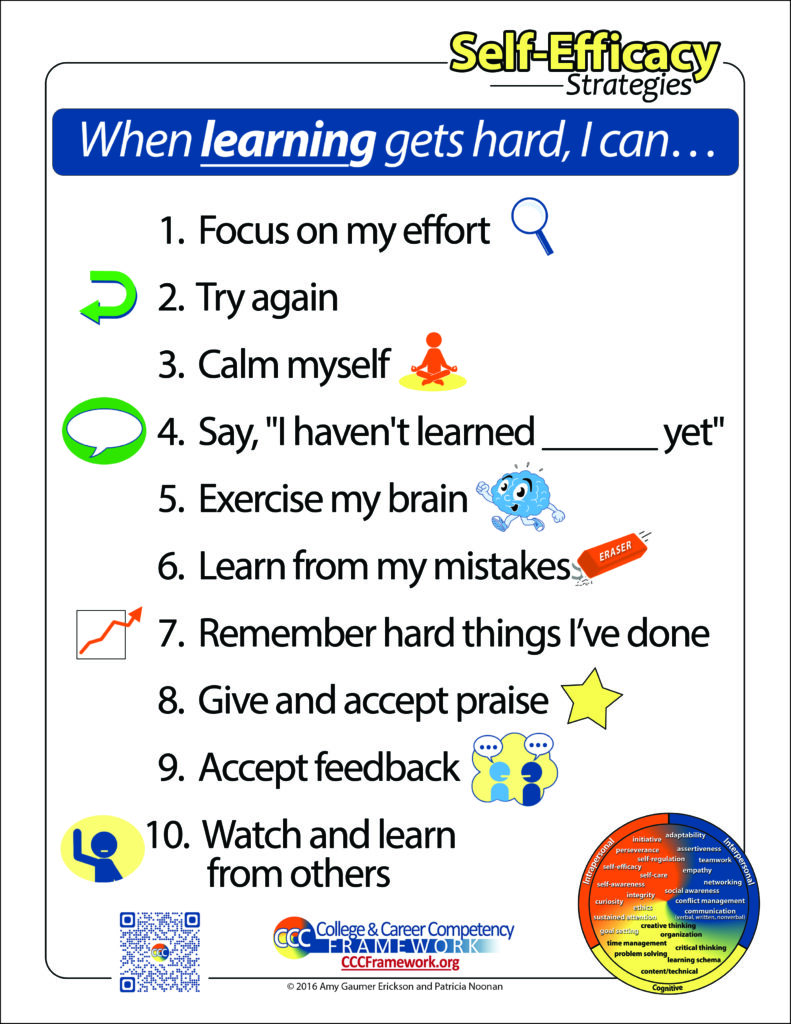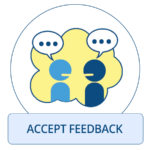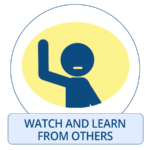Does your child struggle with being confident in their ability to learn something new? Maybe they view feedback as criticism and don’t know how to apply it to learning. Do they have difficulty accepting praise from others or tend to be derogatory about their accomplishments? Learning Self-Efficacy Strategies can increase your child’s confidence and help them understand how to use feedback and praise to overcome challenges they experience when learning something difficult.
Definition
Self-efficacy is an individual’s perceptions about their capabilities to perform at an expected level, achieve goals, and complete moderately challenging tasks (Gaumer Erickson & Noonan, 2018).
Students use Self-Efficacy Strategies to persist in learning.
Student Impacts
Teachers providing self-efficacy instruction and classroom practice observe student growth, including:
- Increased self-reflection and self-awareness
- Increased belief that ability grows with effort
- Improved confidence in their own abilities
- Improved quality and timeliness of work
- More openness to constructive feedback
Research in elementary and secondary education identifies proven student impacts from teaching self-efficacy.
- Students with stronger self-efficacy will engage more, work harder, and persist longer when they encounter difficulties (Zimmerman, 2000).
- Of many factors, self-efficacy has “the strongest positive and significant association” with life satisfaction (Moksnes et al., 2019, p. 226). It also helps to counteract many stressors, including peer pressure, school/leisure conflict, and school performance.
- By receiving explicit instruction in self-efficacy, students increase their interest in pursuing challenging careers (Falco & Summers, 2019).

Learning self-efficacy helps adolescents become more self-assured. Self-efficacy also helps teens understand how to manage their emotional reactions when they experience challenges, use feedback from others, and analyze others’ successes to increase their own persistence.
Watch the one-minute video What Is Self-Efficacy? with your child to learn more about what self-efficacy is and why it is important. Afterward, share examples of times when you didn’t feel confident and gave up rather than persevering. Ask your child to describe situations where they have experienced low self-efficacy, using these questions:
- When have you given up on learning something instead of focusing on your effort and continuing to try to learn it?
- Describe a time when you focused on your effort, didn’t give up and you learned something that was difficult. What did you say to yourself? How did accepting feedback help you?
- Why do we sometimes feel like giving up instead of trying again?
Explain that you are going to help them learn Self-Efficacy Strategies so they can understand how to persevere through challenges.
These four Self-Efficacy Strategies will help your child believe in their abilities: focus on my effort, give and accept praise, accept feedback, and watch and learn from others. Additional strategies are explained on the primary and intermediate parent guidance.

Focus on My Effort
Adolescents need to make the connection between putting forth effort and making progress. When they understand that putting forth more effort will increase their progress, they are more likely to persist through obstacles and continue learning. Understanding what effort is and what it feels like when they are using effort is the first step in helping them understand how to focus on their effort.
Explain that believing you can do hard things starts with focusing on your effort. Effort means putting forth a lot of energy to engage in learning and not giving up if you aren’t successful the first time.
Provide a personal example of something challenging you eventually accomplished. Describe how you felt and what you were thinking when you began. Emphasize that you used effort (i.e., tried really hard) and didn’t give up even when you felt frustrated. Ask your child to remember a time when they were frustrated because they couldn’t do something:
- How did it feel?
- What did you say to yourself? What did you do?
Watch the video Focus on My Effort and discuss what it feels like when you try really hard:
- What does focus mean?
- How do you know when you are focused?
- When have you focused on your effort to learn something?
Emphasize that focusing on effort is more important than focusing on the outcome. When we put forth effort, it is more likely that we will experience the outcome we want. When we are aware of our progress, it helps us know that effort and progress are related.
Discuss something challenging your child is currently learning and the amount of effort they are using. Then show them the Effort and Progress Tracker and explain that you are going to help them focus on their effort for something they are currently learning. Ask:
- What is something difficult you are currently trying to improve or learn?
- What could you do to focus on your effort and track your progress as you are learning it?
Support your child in practicing the strategy focus on my effort by reviewing their progress on the challenging task they identified. Discuss what they could do to maintain or improve their effort. You can use the Effort and Progress Tracker to guide your discussions anytime they need or want to learn something challenging.
Reinforce what your child has learned about focusing on effort by asking them to research their favorite athlete, musician, or historical figure. Have them identify specific techniques the person used to focus on their effort and eventually become successful. Remind your child that they will experience difficulties in school, when learning a new sport, or when practicing a musical instrument. Tell them that, by focusing on their effort, they are learning to keep trying and overcoming their fear that they can’t do something.

Give and Accept Praise
Understanding how to give specific, effort-based praise and accepting similar praise helps us feel confident that we can complete difficult tasks. When you give specific, effort-based praise, it increases your child’s self-efficacy because it draws attention to the progress they have made and reminds them of difficult things they have learned in the past. There are times when accepting praise can be difficult, especially if the person receiving the praise lacks confidence or doubts the authenticity of the praise.
Watch the video Give and Accept Praise. Afterward, discuss the key concepts by asking:
- The next time you or your friend says, “I can’t do this,” what might you say?
- How will giving and accepting praise help you learn?
Show your child the Praise Do and Don’t chart and discuss each column.
| Praise DO and DON’T | |
| Do say | Don’t say |
| “You worked hard, and you are learning.” | “You are way better at _____ than your friend.” (Explanation: This phrase compares someone to another person. Remember that we are all working from different starting points, and we should focus on our own effort and progress rather than comparing ourselves to others.) |
| “I notice that you are focusing on your effort and getting better at _____.” | “You are so smart.” (Explanation: This phrase praises a person for something that is out of their control. Saying someone is smart implies that they are either born smart or not. People should feel that they can improve with effort.) |
| “You did _____ well. You could get better if you tried _____.” | “Good job!” (Explanation: This phrase is not specific. Remember to provide praise that indicates what the person did well and what they could do to improve.) |
Ask your child to think about the praise they have given or recently received. Ask:
- Which column would you use to classify the praise you have recently given or received?
- Now that you know that praise should be specific and effort-based, what would you say to a friend who said, “I will never understand this”?
You can support your child in giving and accepting praise by providing them with specific, effort-based praise anytime they are learning something new or experiencing frustration as they are trying to improve their ability to do something.

Accept Feedback
Your child can improve their self-efficacy by understanding how to accept feedback as they are learning something. Accepting detailed feedback will help them build their self-efficacy because information from others increases their self-awareness and helps them understand their areas of strength and challenge. When they understand how to apply suggestions, corrections, or ideas that others provide, they can use that information to improve their learning.
When we receive constructive feedback, it’s important to remember that the feedback is not a personal judgement but instead provides ideas for improvement. Becoming defensive and arguing with the person can be typical reactions for someone who has low self-efficacy. Your child may feel like they failed and shouldn’t take on similar challenges instead of focusing on personal growth. Support your child in accepting feedback by emphasizing that feedback can help them improve and that simply saying “Thank you” is appropriate.
Watch the video Accept Feedback with your child. Afterward, discuss why accepting feedback is important. Use these questions to guide your discussion:
- Why do we sometimes take feedback personally and become angry or hurt by it?
- How can learning to accept feedback help you?
- What will you do the next time someone gives you feedback?
Discuss the difference between dismissing feedback and accepting it by providing them with a few examples. Explain that we dismiss feedback when we don’t feel confident or if we doubt the authenticity of the feedback. It is important to think about the feedback you receive and respond to it by accepting it rather than belittling your efforts or ignoring it.
Support your child in learning how to accept feedback by providing them with a few scenarios and asking them to develop a response that accepts the feedback in each.
- If your science teacher suggested that you check for spelling errors before turning in your lab reports, what could you say or do to accept the feedback?
- If I told you that changing your attitude to be more positive about taking hard classes in school this year would help you believe in yourself, what could you do or say to accept my feedback?
- If your friend told you that when he is telling you a story you should put away your phone and focusing on what he was saying, what could you say or do to accept the feedback?
You can continue to improve your child’s ability to accept feedback by asking them to rephrase their responses to feedback anytime you notice them being dismissive or defensive. Encourage reciprocal accountability by asking your child to do the same when they notice you dismissing feedback.

Watch and Learn From Others
When adolescents learn to think about and analyze how others have succeeded, they can use that knowledge to build their belief in themselves. They learn from another person’s successes as well as their mistakes when they consider how that person overcame challenges and the actions that led to their success. Watching and learning from others is a strategy that will help your child build their self-efficacy.
Watch the video Watch and Learn From Others with your child. Afterward, discuss how analyzing others’ successes and mistakes will help increase their own confidence. Ask:
- When have you watched and learned from someone else?
- Who might you can watch and learn from?
Provide your child with an example of someone you both know and how you watched and learned from them—for example, an older sibling, parent, or friend. Include details about when you observed them and what you learned from their mistakes.
Tell your child that you are going to show them another video about learning from others. In this video, they will learn about 10 famous people who experienced challenges and eventually became successful. As they watch, they should think about what they can learn from each person. Show them the video 10 Famous Failures Who Never Gave Up and Succeeded in Life. Afterward, discuss how each person overcame challenges and failures and what we can learn from them.
You can help your child watch and learn from others by identifying people such as teachers, coaches, or older siblings that they can watch and learn from when they encounter a challenge. Remind them of the 10 famous failures in the video and how overcoming failures led to success for each person. As your child experiences challenges, encourage them to think about how others overcame similar challenges.
Next Steps
- Practice focusing on effort by referring to athletes, musicians, or celebrities who used effort to become successful. Talk about the different ways they focused on their effort, and discuss how lack of effort would have impacted their success.
- Give praise to your child that is specific and effort-based anytime you notice they are improving their ability to do something. Prompt them to accept praise when others notice their improvement, and encourage them to giveothers specific and effort-basedpraise when they have the opportunity.
- Remind your child that accepting feedback is an important part of building their self-efficacy. Support them in applying feedback they receive rather than dismissing it, and give them feedback on specific self-efficacy concepts you notice them using when they are learning something challenging.
- Encourage your child to watch and learn from others by remembering the successes and failures people around them have experienced and using that knowledge to determine ways they can improve. When your child experiences setbacks, share examples of people you watched and learned from and include details about how they persisted.
